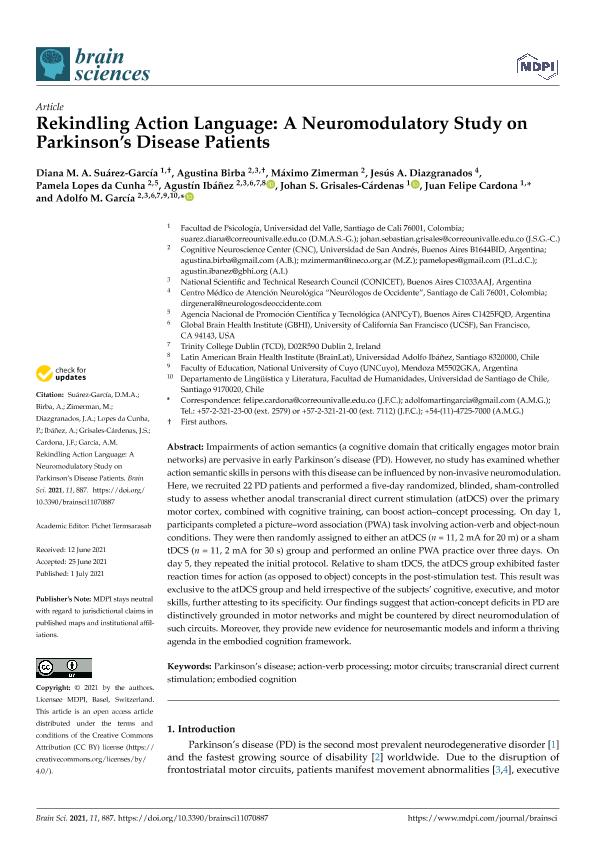Artículo
Rekindling action language: A neuromodulatory study on parkinson’s disease patients
Suárez García, Diana; Birba, Agustina ; Zimerman, Maximo; Diazgranados, Jesús A.; Lopes Da Cunha, Pamela Johanna
; Zimerman, Maximo; Diazgranados, Jesús A.; Lopes Da Cunha, Pamela Johanna ; Ibañez, Agustin Mariano
; Ibañez, Agustin Mariano ; Grisales Cárdenas, Johan; Cardona, Juan Felipe; García, Adolfo Martín
; Grisales Cárdenas, Johan; Cardona, Juan Felipe; García, Adolfo Martín
 ; Zimerman, Maximo; Diazgranados, Jesús A.; Lopes Da Cunha, Pamela Johanna
; Zimerman, Maximo; Diazgranados, Jesús A.; Lopes Da Cunha, Pamela Johanna ; Ibañez, Agustin Mariano
; Ibañez, Agustin Mariano ; Grisales Cárdenas, Johan; Cardona, Juan Felipe; García, Adolfo Martín
; Grisales Cárdenas, Johan; Cardona, Juan Felipe; García, Adolfo Martín
Fecha de publicación:
07/2021
Editorial:
MDPI
Revista:
Brain Sciences
ISSN:
2076-3425
Idioma:
Inglés
Tipo de recurso:
Artículo publicado
Clasificación temática:
Resumen
Impairments of action semantics (a cognitive domain that critically engages motor brain networks) are pervasive in early Parkinson’s disease (PD). However, no study has examined whether action semantic skills in persons with this disease can be influenced by non-invasive neuromodulation. Here, we recruited 22 PD patients and performed a five-day randomized, blinded, sham-controlled study to assess whether anodal transcranial direct current stimulation (atDCS) over the primary motor cortex, combined with cognitive training, can boost action-concept processing. On day 1, participants completed a picture-word association (PWA) task involving action-verb and object-noun conditions. They were then randomly assigned to either an atDCS (n = 11, 2 mA for 20 m) or a sham tDCS (n = 11, 2 mA for 30 s) group and performed an online PWA practice over three days. On day 5, they repeated the initial protocol. Relative to sham tDCS, the atDCS group exhibited faster reaction times for action (as opposed to object) concepts in the post-stimulation test. This result was exclusive to the atDCS group and held irrespective of the subjects’ cognitive, executive, and motor skills, further attesting to its specificity. Our findings suggest that action-concept deficits in PD are distinctively grounded in motor networks and might be countered by direct neuromodulation of such circuits. Moreover, they provide new evidence for neurosemantic models and inform a thriving agenda in the embodied cognition framework.
Archivos asociados
Licencia
Identificadores
Colecciones
Articulos(SEDE CENTRAL)
Articulos de SEDE CENTRAL
Articulos de SEDE CENTRAL
Citación
Suárez García, Diana; Birba, Agustina; Zimerman, Maximo; Diazgranados, Jesús A.; Lopes Da Cunha, Pamela Johanna; et al.; Rekindling action language: A neuromodulatory study on parkinson’s disease patients; MDPI; Brain Sciences; 11; 7; 7-2021; 1-16
Compartir
Altmétricas



